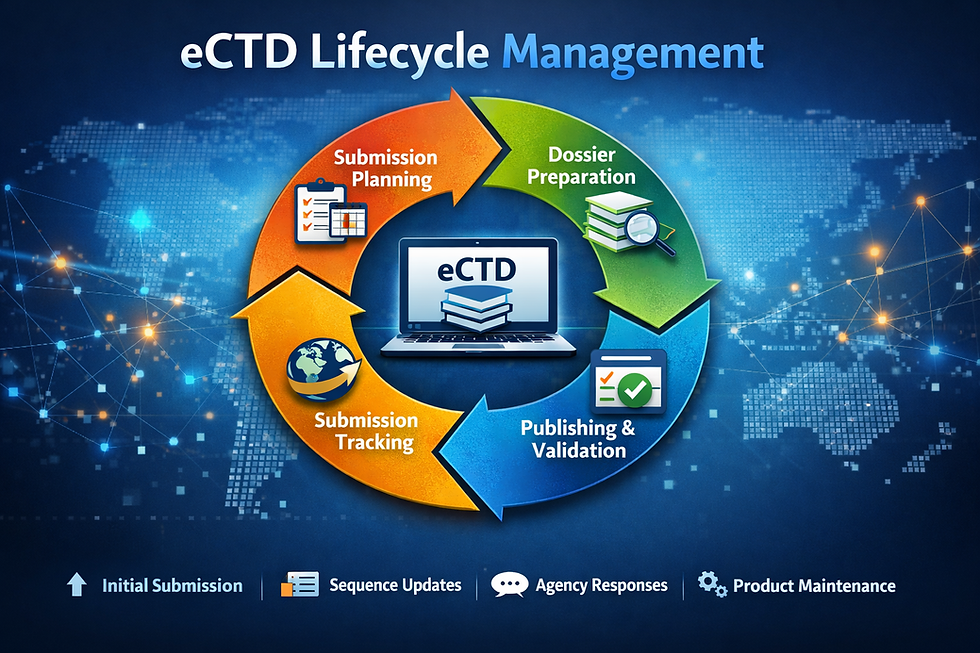Regulatory Services in AI Medicine: The Next Frontier for UK Healthcare
- ECTD Pharma - Regulatory Affairs Consultancy
- Sep 16, 2025
- 3 min read

Introduction
Artificial intelligence (AI) is transforming healthcare — and with it, the regulatory services sector. In the UK, where the NHS handles vast amounts of patient data and the government seeks global leadership in AI and life sciences, regulation of AI in medicine is one of the most urgent priorities.
For companies developing AI-powered devices or software, navigating the UK regulatory framework is essential. For boutique regulatory consultancies, it represents a major growth opportunity: providing expert regulatory services that guide innovators through MHRA requirements, compliance, and market access.
This article explores how AI in medicine is shaping the demand for regulatory services, what challenges exist, and how consultancies can help healthcare innovators succeed.
1. What Is AI in Medicine?
AI in medicine uses machine learning and advanced algorithms to support clinical decision-making, diagnostics, and healthcare delivery. These technologies are regulated as Software as a Medical Device (SaMD) or Artificial Intelligence as a Medical Device (AIaMD).
Examples include:
AI systems that read CT scans for early cancer detection.
Predictive algorithms to forecast hospital admissions.
Digital pathology platforms analysing tissue samples.
AI-driven apps for clinical decision support.
Each of these innovations must pass rigorous regulatory services processes before reaching patients in the UK.
2. The UK Regulatory Framework for AI
The UK’s Medicines and Healthcare products Regulatory Agency (MHRA) oversees medical devices, including AI-based software.
UK Medical Device Regulations (UK MDR 2002): The foundation for compliance.
UKCA Marking: Required for products marketed in Great Britain.
MHRA’s AI as a Medical Device Change Programme: Reforming how AI systems are classified, validated, and monitored.
For businesses, expert regulatory services are crucial to navigate these evolving requirements, avoid delays, and maintain compliance.
3. Why AI in Medicine Matters for Regulatory Services
AI is central to the UK’s life sciences strategy:
Government Priority: AI is a growth driver for healthcare and the economy.
NHS Efficiency: AI can reduce backlog pressures and staffing strain.
Global Standards: The UK wants to lead in setting frameworks for safe, ethical AI.
This creates a growing demand for regulatory services that combine compliance expertise with technical understanding of AI systems.
4. Challenges for AI Regulation
AI brings unique hurdles:
Transparency: How do regulators trust “black box” algorithms?
Adaptiveness: If AI updates itself, does it need re-approval?
Data Bias: Poor training data risks unequal care outcomes.
Cybersecurity: AI tools must be resilient against attacks.
Validation: Traditional clinical trials don’t always fit AI — requiring innovative regulatory approaches.
Boutique consultancies offering regulatory services can step in to help developers anticipate and solve these issues.
5. Recent UK Developments
NHS AI Lab: Supporting evaluation and adoption of AI tools.
MHRA Roadmap: Modernising SaMD/AIaMD regulations.
Regulatory Sandboxes: Testing AI with regulators in controlled settings.
Global Alignment: UK working with FDA and EMA on shared AI principles.
Each initiative creates opportunities for regulatory services firms to help clients prepare evidence, submissions, and compliance strategies.
6. Case Studies
Kheiron Medical Technologies: AI breast screening tool Mia, deployed in the NHS, required strong regulatory guidance.
DeepMind & Moorfields: AI detecting eye diseases, needing explainability and ethical clearance.
Babylon Health: AI-powered app highlighting regulatory pitfalls in consumer health tech.
Behind each success — and challenge — are regulatory services ensuring compliance, safety, and public trust.
7. What Regulatory Professionals Must Do
For regulatory affairs specialists, the rise of AI means new priorities:
Understand machine learning basics.
Engage early with the MHRA.
Strengthen data governance for GDPR compliance.
Create adaptive change protocols.
Focus on real-world evidence generation.
Translate compliance into clinician confidence.
This is where regulatory services add maximum value: providing structured, expert guidance for innovators.
8. The Boutique Consultancy Advantage
Boutique regulatory consultancies are perfectly placed to lead in AI:
Agile and responsive to evolving MHRA guidance.
Able to specialise in AI/Software as a Medical Device.
Offer hands-on, practical regulatory services tailored to startups and mid-sized companies.
Provide cost-effective support compared to larger CROs.
In AI, smaller consultancies with focused expertise can be the most powerful partners.
9. Future Outlook
By 2030, we expect:
MHRA frameworks for adaptive AI models.
Closer alignment between AI, genomics, and precision medicine.
International harmonisation of AI regulations.
More emphasis on equity in AI validation.
AI-driven transformation of clinical trial processes.
This will expand demand for regulatory services, creating opportunities for consultancies that specialise in advanced technology regulation.
Conclusion
Artificial intelligence is reshaping healthcare — and the demand for regulatory services is rising with it. The UK has positioned itself as a leader in AI and medical device regulation, but companies cannot navigate this alone.
Regulatory professionals and consultancies have a critical role: ensuring compliance, accelerating approvals, and safeguarding patients. Boutique firms, in particular, can thrive by offering specialised, flexible, and expert regulatory services to AI innovators.
AI is the future of medicine — and regulatory affairs is the foundation that makes it possible.




Comments